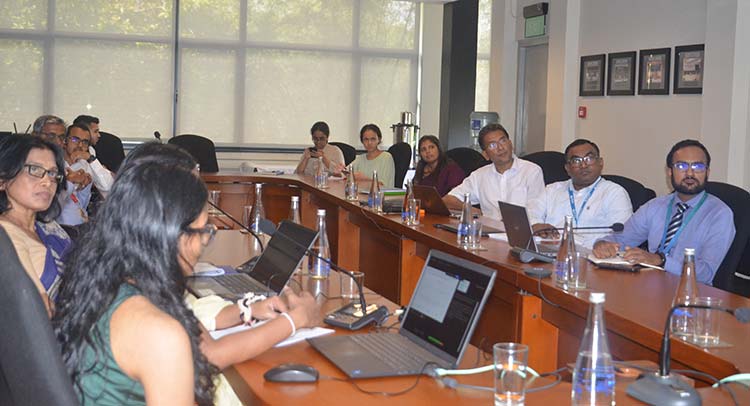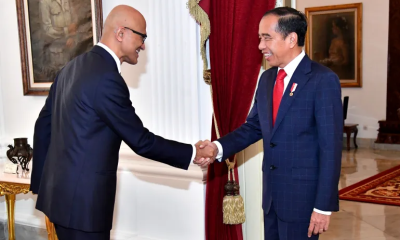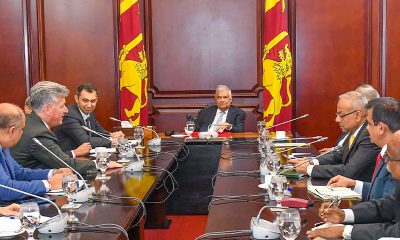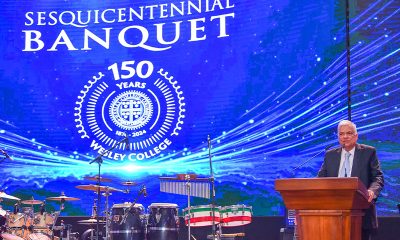Business
Expanding Ed-tech through partnerships, collaborations, and AI to improve quality education: Insights for Sri Lanka

The COVID-19 pandemic underscored the critical role of technology in maintaining educational continuity during crises. As the world increasingly turns to educational technology (Ed-tech) solutions, it is essential to align these advancements with Sustainable Development Goal 4 (SDG 4), which advocates for inclusive and equitable quality education for all. The Institute of Policy Studies of Sri Lanka (IPS) recently hosted a hybrid Roundtable Discussion titled “Ed-tech Towards Achieving SDGs,” offering valuable perspectives on the role of Ed-tech in bridging educational gaps and the facilitators and barriers to the expansion of Ed-tech going ahead.
Currently, the primary focus in Ed-tech revolves around adapting to rapidly evolving technologies. There are also concerns that overreliance on technology could widen disparities in accessing quality education. The preceding discussion provides insights into how Ed-tech can be used to address these gaps and overcome barriers, emphasising the importance of regional cooperation and public-private partnerships, and the recent emergence of AI.
Regional Collaboration in Facilitating Ed-tech
A key insight from the discussion was the pivotal role of regional cooperation in accelerating the implementation and adoption of Ed-tech. Ms Cahya Raith from the Southeast Asian Ministers of Education Organization – Regional Open Learning Center (SEAMOLEC) underscored the role of knowledge sharing, joint research and development efforts, and collaborative capacity-building programmes in advancing Ed-tech in the region.
Similarly, the SEAMEO plays a crucial role in the region’s Ed-tech landscape, fostering innovative practices in Open and Distance Learning (ODL) with a keen eye on integrating metaverse and artificial intelligence (AI) technologies. They are also looking at enhancing the capabilities of educators through their regional training programmes which are designed to improve technology integration in the learning process.
The alignment of Southeast Asian countries towards a knowledge-based economy has emerged as a driving force in shaping Ed-tech policies in the region. Ms Ratna Hartine, representing Angel Investment Network Indonesia (ANGIN), noted that Ed-tech policies within the region are more focused on digitising national education data and administration. This includes establishing digital repositories like lectures, ebooks, simulation software and other learning materials, and seeking to expand access to quality education by leveraging mobile learning platforms and by equipping teachers with the required skills through teacher training programmes.
The discussion also shed light on the critical role of public-private partnerships (PPP) in expanding Ed-tech. Mr Asith de Silva, Senior Manager – Social Innovation at Dialog Axiata PLC, discussed how their collaboration with Sri Lanka’s Ministry of Education significantly contributed to the success of ‘the ‘Nenasa’ programme. Nenasa has been delivering educational content for Sri Lankan students since 2009 via a variety of technological means including TV channels and mobile apps, as well as teacher training programmes for teachers in utilising technology in the teaching process.
India’s ‘OLabs’ is another noteworthy PPP in South Asia that makes lab resources readily (anytime) and remotely (anywhere) available to students without access to physical labs or where equipment is not available in their schools due to scarcity or cost. The initiative was pioneered by AmritaCREATE and C-DAC under a research grant from the Ministry of Electronics and Information Technology in India, and collaborating and funding support from the public sector has been instrumental in developing such Ed-tech initiatives that support education in schools.
Improving Access for Vulnerable Groups
A significant part of the roundtable focused on using Ed-tech to enhance access to education for vulnerable populations. Several Ed-tech initiatives in South Asia, Southeast Asia, and the Middle East and North Africa (MENA) region that cater to this purpose include Pakistan’s ‘WonderTree’ initiative for children with disabilities, Indonesia’s ‘BEEP’ for out-of-school children, India’s ‘OLabs’ and ‘Class Saathi’ for rural children and children from underprivileged areas.
Importantly, Mr Georges Boarde, Senior Education Programme Specialist from the United Nations Relief and Works Agency for Palestine Refugees (UNRWA) in the Near East, highlighted the role played by the UNRWA e-learning platform in improving access to remote learning material and resources for Palestinian refugee students.
He also stated how they prioritise enhancing education resilience by improving the preparedness of students and teachers for remote learning and teaching in times of emergencies, such as the COVID-19 pandemic and the ongoing conflict in the region. While the UNRWA is a humanitarian organization that provides its services free to refugees, Mr Boarde highlighted the lack of internal revenue sources as a main barrier to implementing their plans for integrating technology in education, as well as the important role played by donors in facilitating the development of Ed-tech, including its scope and quality.
AI’s Role in Quality Education
The discussion also focused on how AI could help education. Dr Gharbi, CEO of Uptitude, a digital learning company, in Tunisia offered insights on the MENA region’s adoption of AI in education through platforms such as Zenon Academy and AI Mentor which uses gamification and other methods to enhance the learning experience of students. But she also emphasised the varying levels of AI integration across countries, with advanced implementations in the UAE and Saudi Arabia, and a growing interest in AI post-pandemic in Tunisia, Morocco, and Algeria.
To add to that, Ms Hartine highlighted Sekolah metaverse community, a PPP in Indonesia that uses AI, augmented reality (AR), and virtual reality (VR) to substitute learning environments like laboratories in schools that lack resources and funding by creating a community. She also noted how such visual experiences are useful for students who struggle with reading. Other participants from the roundtable further highlighted the role of AI in reducing resource requirements, including personnel, reducing costs, and guiding teachers, among its other uses.
Experts from the government sector, private sector, and donor agencies contributed valuable insights to the roundtable discussion. The event, based on a recent IPS study financed by the International Development Research Centre (IDRC) through Southern Voice and Group for the Analysis of Development (GRADE), provided a comprehensive overview of the Ed-tech landscape and its potential in achieving SDGs.
Business
AHK Sri Lanka champions first-ever Sri Lankan delegation at Drupa 2024

The Delegation of German Industry and Commerce in Sri Lanka (AHK Sri Lanka) proudly facilitated the first-ever Sri Lankan delegation’s participation at Drupa 2024, the world’s largest trade fair for the printing industry and technology. Held after an eight-year hiatus, Drupa 2024 was a landmark event, marking significant advancements and opportunities in the global printing industry.
AHK Sri Lanka played a pivotal role in organising and supporting the delegation, which comprised 17 members from the Sri Lanka Association for Printers (SLAP), representing eight companies from the commercial, newspaper, stationery printing, and packaging industries. This pioneering effort by AHK Sri Lanka not only showcased the diverse capabilities of Sri Lanka’s printing sector but also facilitated vital bilateral discussions with key stakeholders from the German printing industry.
Business
Unveiling Ayugiri: Browns Hotels & Resorts sets the stage for a new era in luxury Ayurveda Wellness

In a captivating reimagining of luxury wellness tourism, Browns Hotels & Resorts proudly unveiled the exquisite Ayugiri Ayurveda Wellness Resort Sigiriya. This momentous occasion, celebrated amidst a vibrant and serene grand opening on the 6th of June, heralds a new chapter in the Ayurveda wellness tourism landscape in Sri Lanka. Nestled amidst 54 acres of unspoiled natural splendour, Ayugiri features 22 exclusive suites and stands out as the only luxury Ayurveda wellness resort in the country offering plunge pools in every room, rendering it truly one-of-a-kind.
The grand opening of Ayugiri Ayurveda Wellness Resort was an enchanting event, where guests were captivated by the melodies of flutists and violinists resonating through Sigiriya’s lush landscapes. As traditional drummers and dancers infused the air with vibrant energy, Browns Hotels & Resorts’ CEO, Eksath Wijeratne, Kotaro Katsuki, Acting Ambassador for the Embassy of Japan and General Manager, Buwaneka Bandara, unveiled the resort’s new logo, marking a significant moment witnessed by distinguished guests from the French Embassy, Ayurveda and wellness enthusiasts along with officials from the Sigiriya area, LOLC Holdings and Browns Group.
“Our strategic expansion into wellness tourism with Ayugiri Ayurveda Wellness Resort Sigiriya symbolises a significant milestone for Browns Hotels & Resorts. Wellness tourism has consistently outperformed the overall tourism industry for over a decade, reflecting a growing global interest in travel that goes beyond leisure to offer rejuvenation and holistic well-being. By integrating the timeless wisdom of Ayurveda with modern luxury, we aim to set a new standard in luxury wellness tourism in Sri Lanka. Whether your goal is prevention, healing, or a deeper connection to inner harmony, Ayugiri offers a sanctuary for holistic well-being” stated Eksath Wijeratne.
Ayugiri encapsulates the essence of life, inspired by the lotus flower held by the graceful queens of the infamous Sigiriya frescoes. Just as the lotus emerges from the murky depths, untainted and serene,
Ayugiri invites guests on a journey of purity and rejuvenation, harmonised with a balance of mind, body and spirit, the essence of nature, echoes of culture and the wisdom of ancient Ayurvedic healing.
Business
HNB General Insurance recognized as Best General Bancassurance Provider in Sri Lanka 2024

HNB General Insurance, one of Sri Lanka’s leading general insurance providers, has been honored as the Best General Bancassurance Provider in Sri Lanka 2024 by the prestigious Global Banking and Finance Review – UK.
The esteemed accolade underscores HNB General Insurance’s unwavering commitment to excellence and its outstanding performance in the field of bancassurance. Through dedication and hard work, the HNB General Insurance team has continuously endeavored to deliver innovative insurance solutions, cultivate strong relationships with banking partners, and provide unparalleled service to customers nationwide. This recognition is a testament to the team’s dedication and relentless pursuit of excellence in the bancassurance business.
“We are honored to receive this prestigious award, which reflects our team’s tireless efforts and dedication to delivering value-added insurance solutions and exceptional service through our bancassurance partnerships,” said Sithumina Jayasundara, CEO of HNB General Insurance. “This recognition reaffirms our position as a trusted insurance provider in Sri Lanka and motivates us to continue striving for excellence in serving our customers and communities.”
























